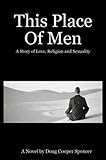 This Place of Men by Doug Cooper-Spencer
This Place of Men by Doug Cooper-SpencerMy rating: 5 of 5 stars
I could never review this book because to view it you'd have to separate yourself from it, to be apart from it, and that was where my problem lay. Despite my most valiant effort to resist its siren song, I found it hard to be detached, and it was quite impossible to ‘view’ it with a professional eye. I tried. I failed. My reading glasses did their best to keep me apart from it, but they soon dissolved as my emotions and hormones flooded my cells as I was sucked deep into the narrative.
After what seemed to be a typical Mills ’n Boon-esque titillating start which attracted my libidinous side but repelled my heart (what would his parents say if they knew he’d entered NY College to troll the streets looking for dicks to suck?), the story settled into a very warm if slightly tense family situation with food, laughter, and a Mama our hero Otis clearly adored, even if he hadn’t seen her for over twenty years. For some reason I felt myself to be incredibly at home, with a humid fecund warmth and humanity coming off the pages as I remembered by own past home life and how I liked it, but how at the same time I’d also been seized and driven by dark, unnameable, unmentionable desires which family must never know.
I never read this book, you see, for to read a book you have to view it and hold it apart from yourself. You have to judge it and tell people what you think, and I couldn’t do that here. I couldn’t think about it because it wasn’t separate from me. I walked right into it. The Kindle disappeared, my bedroom vanished and I walked straight into the scene: Terrell with his wife and boisterous kids, the suave Stanton with more than a skeletal wishbone in his closet, the bishop trying to make his swansong, and of course Otis, poor lonely lovely brave Otis who carries the cross imposed upon him by the very ones who were supposed to hug him and make him better, not wring him tight and hang him out to dry. Poor Otis with his emotional back broken by those who were themselves crippled by their own blind prejudiced rituals and beliefs.
The sense of family life is incredible and the feeling that I’d walked right into the scene was particularly strong. I felt that the only reason the characters didn’t talk to me was because I was invisible, and I felt that if I’d materialised from nowhere in the middle of a meal, I’d have been handed a plate of food which I’d have devoured heartily. The fact that I was different, a white man, would have been neither here nor there. And even on the side of Otis the loner in the book, I felt his inner hospitality was vibrant and alive. Of course I’d never have deigned to ask author or character that I might approach Otis’s feet, but I felt nonetheless that if he’d spotted me he’d have brought us both a cup of coffee, told me how lonely being a fictional hero can be, and I’d have blubbed in agreement. He’d have welcomed me into an angelic part in Place of Men, and I’d have welcomed him back right into the lonely corners of the Cedilla novel. Would that either of us had had that power, or the right.
Finally the sex scenes. The book subtitles itself “A Story of Love, Religion and Sexuality”, a subtitle I felt may pull a lot of people in, whilst at the same time putting another lot of people off, and the people who were pulled in might not like the story much when they started to read it, and the people who didn’t feel attracted to the cover blurb would be the people who’d get the most out of it if they actually read it. The sex scenes themselves, by the way, were for me evocative, poignant and very effective, with that mystical elusive element left to the imagination. After all, we don't want every pore, drop and detail pushed into our face when we'd rather bring it here ourselves. I could not imagine these erotic — and limited — episodes giving offense to anybody.
I was one of the ones who felt that the opening paragraphs put the story in danger of lapsing into pornography and titillation, as mentioned earlier, and for that reason I put off reading the book for a very long time. There was also one sentence that I felt was out of place and didn’t work for me at all well. Nonetheless, these are venial issues. I normally give such books a wide birth and if I do dip into them, my eye is usually jaundiced because I tend to berate it 3 times per page before giving it up in disgust, or merely boredom. It’s a lovely, heartfelt, beautiful story and I am truly delighted that it’s the first part in a trilogy. That ‘wishing it would never come to an end’ feeling was easily (and fortunately) assuaged for me by the knowledge that I had two more in store. I wanted to live forever in this warm male gay, family-oriented yet homœpatherotic world, when the wall between me the reader and the story turned from plasterboard to paper. I only had to poke it with my finger. The membrane was popped with a minimal yelp and the story and I became One.
View all my reviews
 Islands
Islands